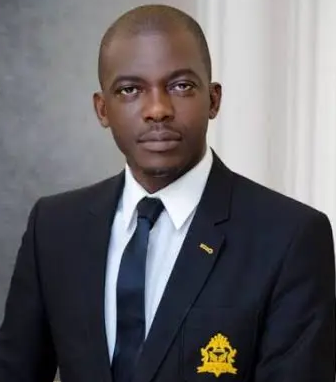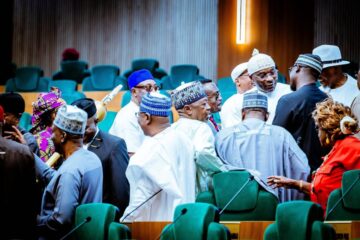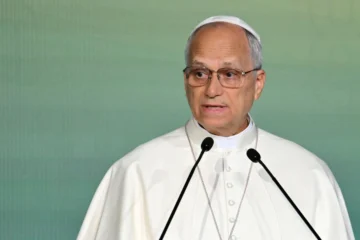We’re making sure returned Abacha loot is working for Nigerians, says ED CLEEN Foundation

Mr Gad Peter is the Executive Director of CLEEN Foundation. The activist, while speaking with JULIANA FRANCIS, reveals the Foundation’s connection with the much talked about late General Sani Abacha’s loot and the Second River Niger Bridge.
How did you get into activism
I got into activism from my early days in the university. I believe that I was born an activist. When I was a child, I did not accept injustice from primary to secondary school. I refused to accept bullying, even of people around me.
As a matter of fact, I have always demanded justice for people. I think it’s just a natural calling, something inherent. While I was in the university, I was a student union leader all through and when I graduated from the university, I was very sure I wouldn’t be able to work in a government system. I wouldn’t be able stay; the system will not accept my approach to issues and so civil society was my best option.
So, from university you always knew the path to tread?
I was very certain that activism was my calling, like some people are called to become clerics. I was called to become an activist.
Does this mean you’ve never worked at other sectors?
All my life, I have worked with non-governmental organisations (NGOs). I started with a local human rights NGO and then I moved to Centre for the Advocacy of Justice and Rights, and then to British Council Creative Associates, Equal Access International and today, CLEEN Foundation. You can see my trajectory has been consistent with my calling and the kind of organisations I worked with.
How long have you been in this field?
I have been around for 15 years and interestingly, even before I graduated from the university, I participated in civil society work.
Have you had any experience that made you almost to quit?
A lot of things had happened but at no point did I feel I needed to quit this work. I felt it is something I really wanted to do and if I stop, I will not be myself.
But there are threats always. I will give you several examples; there was a time we planned protest because of fuel increase by President Obasanjo, later by Yar’Adua. The Department of State Services did not want the protests to happen, also the police and the military did not want it to happen.
We were either invited to their offices or we were asked not to do it but because we believed in these protests, we participated actively and dammed the consequences. During my school days, we had reasons to protest and the school authorities threatened to suspend or rusticate us, but we went ahead to do it because we believed it was for the good of the Nigerian students.
We have travelled several times for protests across the country while I was a student. As an activist I have supported labour movement, but one of those things that stood out for me was at the peak of the killings in Jos. When Jos had its crisis from 2001 to partially currently now, even though it was not as bad as it used to be, I had instances where we questioned the military for their inability to provide security for communities which were attacked.
For instance, Dogona-Hawa where over 300 women and young people were killed, and we had to question the then military leader; we asked where they were and what they were doing to allow such killings.
I remembered the first statement we issued after the military went to sleep. The people were killed and they didn’t understand why we issued that statement. We issued that statement because we felt the military didn’t do what needed to be done.
The truth is that Dogona-Hawa is less than an hour from the state capital, so how could such killings happened and there were no security operatives on ground to protect the victims?
We had issues with the military concerning the conduct of its personnel and how they were brutalising people, asking them to lie down inside drainages because there was a State of Emergency and there was a curfew.
We felt soldiers were going extra mile in dealing with people and that was an issue we needed to address. Thus, responding to those issues were a clear threat to me, to my organisation and my family.
But again, we stood out grounds and we came out victorious. All of these are examples where I felt threatened. In fact, I have received a couple of letters, threatening me, that were sent to me by organisations that felt I and other activists were speaking too loud about certain impunity or act of extra-judicial killings or lack of response by people in authority. They felt that way because they were benefitting from such kind of thing.
Was there any pressure from family members to quit activism?
I will not say I have had any family pressure concerning the type of work I do. My father understood me as a child and what he kept telling me anytime we were doing NANS trouble was that a living rat was better than a dead lion.
He said that whatever I do, I must ensure I stay alive. My wife met me as an activist and she accepted me as an activist and I have got all of her support in the work I do. She knows that my work is a risky one, and so we discussed as a family, what could happen, what needed to be done and what kind of structure do we need to put in place to ensure that the family does not suffer in case of any challenge. Challenges which could come up because of my involvement in activism.
What is the connection of CLEEN Foundation to late General Sani Abacha’s loot?
You know the Abacha’s loot was recovered by the current government even though we know that it was the Goodluck Jonathan’s government that started the process. It is this government that succeeded in getting the loot, part of the agreement from the US government, was that the Nigerian government should ensure the loot would not be re-looted.
Our government should be able to show what it was going to do with the money, how the money was going to be spent and how the money was going to add value to the lives of Nigerians irrespective of religion, ethnicity, political affiliation, gender or age.
It is in that direction that the Federal Government and the U. government agreed that they needed to have a civil society organisation that would be able to monitor the implementation of the Abacha’s loot, especially relating to the Second Niger Bridge, the Abuja-Kano Express Road and the Lagos-Ibadan Expressway which I am sure all of these infrastructure, especially the Second Niger Bridge and the Lagos-Ibadan Expressway, have been a challenge to a lot of people in Nigeria.
A bidding process happened and CLEEN applied like other organisations and we were picked based on our track records and previous performances. We have been doing a lot of work for the good of Nigerians so we were picked to pay attention to the issue of child labour around the project sites because most often when contractors are working, community people want their children to participate either to fetch water, mix cement or other things, and the government did not want to have anything like child labour.
We paid attention to ensure that children were not part of that process. There was no child labour around those projects. We were interested in the procurement process. We were interested in the accounting process and used forensic experts to do that.
Basically, we were in partnership with the Federal Government to ensure that the process was executed according to agreements signed.
According to the specifications, and also to ensure that Nigerians are not short-changed. As we speak now, most of the projects are almost 80 to 90 per cent completed. I must add that it was not the entire length and breadth of the project that the Abacha’s recovered loot is being used for, there are certain parts of the projects, which the Federal Government’s budget is fixing. The Abacha’s loot has specific areas where the money is being used. We have all the documents and the areas, so when we go to the field we pay attention to these details.
The money is not just for only building of bridges?
The money is basically for building of bridges, for the two major roads I talked about…the Lagos-Ibadan Expressway and of course the Abuja-Kano Expressway. Before now, the Federal Government, about seven years ago, gave N5000 cash to the poorest of the poor in Nigeria.
We were made to understand that it was from the Abacha’s loot that the money was taken and given to people and so again, these are some of areas the money has gone to, and what we are focusing on is how to reconstruct and build the Abuja-Kano Expressway, the Lagos-Ibadan Expressway and the Second Niger Bridge.
But there were insinuations that the returned Abacha loot was shared among a few Nigerian leaders?
You know there is a deficit of trust between the government and the citizens over the years because in the past, looted property were re-looted again by our government. Nigerians are always suspicious of their government’s activities. But I tell you that under this process, it is not true. I can confidently tell you that what we are working on, and in the next few weeks, it will be aired via jingles across many states in Nigeria. The jingle is ready and we are just trying to identify the radio stations to work with.
We are going to have news commentaries and hopefully, we are going to have press conferences to draw attention to stakeholders on that issue. We are going to have a small meeting among CSOs either across the three zones or we invite them to a central location.
We will update them on our contribution and efforts in the partnership, and for us to all learn from it and ensure that we keep an eye on the projects. And it’s not only because it’s part of the Abacha’s loot, but we should be interested in the quality of execution of every other projects where the taxpayers’ money goes into.
We think as CSOs, we have that major responsibility which is again the reason we think that meeting will happen. I assure you that between now, and the first week of November, a number of radio stations will be broadcasting the messages on the recovered loot and how much has been spent.
But in order to help those that will read this interview, I mean this press interaction or listen to it, if you go to www.assestrecovery.org.ng, you are going to have more information or what you need to do is just go to CLEEN website, you will be able to have information on how much is the total amount of money and how the money was distributed or spent on the project.
With respect to shrinking civic space, what is your advice to activists?
I want to say that the harvest is much but the labourers are few. I think we need to have more activists. We need to have more people speaking up and we need to have more people demanding accountability, transparency and good governance.
I tell people that wake up in the morning or anytime to say ‘civil society organisations what are you doing,’ I usually retorts, ‘what have done and what are you doing?’ because demanding good governance is everybody’s business. To make sure we have a country where things work is everyone’s problem, not just the CSOs.
You are part of the system and you are feeling the effect of the bad governance, injustice and others. Why must you wait for an activist to wake you up to do what you’re supposed to do?
Which is why some of us were happy with the #EndSARS protest because the #EndSARS protest was an organic protest. People woke up and said, ‘look, we’re not satisfied with this process,’ and they felt they needed to address these issues. You can see some of these issues have been addressed.
If they had not taken that stand, I am very certain the Federal Government and police would not have reacted and it would have been business as usual. As we move into the 2023 election, my advice to Nigerians is to ensure that they have a PVC and to ensure they vote.
They should ensure they will be at the right places to cast their votes. They should ensure they vote for a candidate that represents a value that they see in themselves and for the Nigerian society.
We need a government that is sensitive, a government that is inclusive and proactive. We need a government that is going to be engaging, but above all, we need a government that has respect for human rights, justice, fairness and that is going to be accountable to its people.
We don’t want another war lord. We don’t want to hold another godfather. We don’t want to hold a titled chief that will look at Nigeria like his empire, who thinks that he knows it all.
We want a government that will accept when they are wrong, that will always create an opportunity to hear from the public and to take home those areas people feel the government has not performed, a government that will come out and give update about its activities as much as possible.











